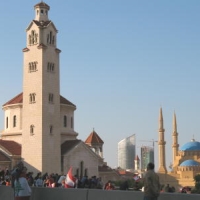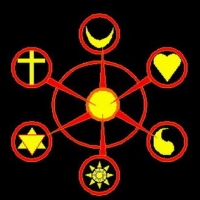- About Us
- Columns
- Letters
- Cartoons
- The Udder Limits
- Archives
- Ezy Reading Archive
- 2024 Cud Archives
- 2023 Cud Archives
- 2022 Cud Archives
- 2021 Cud Archives
- 2020 Cud Archives
- 2015-2019
- 2010-2014
- 2004-2009
 |
Church of Scientology |
Work had been cold, dusty and noisy. Home was where I was headed.
 My headphones were on, my brain was off and I was in a walking sprint when I stopped short, gasping for breath — from shock — wondering if a bomb had exploded. Before me stood numerous figures clad in ragged clothes but curiously wearing either death masks or bandanas wrapped around their mouths. Thankfully, soon enough I spied them moving and handing out papers. It was only a protest. I sighed in relief and accepted a brochure. It was about the Church of Scientology and how they take money from people. Another brochure was handed to me. It claimed that the Church used brainwashing techniques and must be stopped at all costs. To my left was the Church of Scientology centre in Toronto – fronted by all of this angry opposition. I felt sympathy for the building at least.
My headphones were on, my brain was off and I was in a walking sprint when I stopped short, gasping for breath — from shock — wondering if a bomb had exploded. Before me stood numerous figures clad in ragged clothes but curiously wearing either death masks or bandanas wrapped around their mouths. Thankfully, soon enough I spied them moving and handing out papers. It was only a protest. I sighed in relief and accepted a brochure. It was about the Church of Scientology and how they take money from people. Another brochure was handed to me. It claimed that the Church used brainwashing techniques and must be stopped at all costs. To my left was the Church of Scientology centre in Toronto – fronted by all of this angry opposition. I felt sympathy for the building at least.
Now, don't get me wrong. I am no Scientologist, and never will be. But I am a religionist, as are most people (if they would only be willing to admit it). I believe strongly in the freedom of religion and the separation of church and state. I believe that all churches and groups exist for some good and that it is probably better to believe in something other than just self-interest. I believe that all religions, if they spread out of necessity, have to become organized and that this organization is a good and efficient thing that can spread the ideas and inspiration that one small group wouldn't have been exposed to otherwise.
The protesters — university students — who were mumbling incoherently through their masks and bandanas seemed to have little of value to say and I wondered if the time they were investing was part of a course in their schools or a requirement for a group that they wanted to belong to. They didn’t have anything to offer me. They clearly had hoped to drum up some kind of excitement but instead it  looked like they had just gotten out of bed. They had chosen two things to pick on for their protest: money and power. On their reasoning, the Church of Scientology wanted money and so it was bad, and the Church of Scientology seemed to hold strong sway over its many adherents and for this it was also bad. I would have tried to argue with the students but, again, work had been cold, dusty and noisy and I wanted to go home.
looked like they had just gotten out of bed. They had chosen two things to pick on for their protest: money and power. On their reasoning, the Church of Scientology wanted money and so it was bad, and the Church of Scientology seemed to hold strong sway over its many adherents and for this it was also bad. I would have tried to argue with the students but, again, work had been cold, dusty and noisy and I wanted to go home.
All sorts of organizations are accused of wanting money or power — or both. Religious organizations seem to be prime targets for such accusations. A quick Google search reveals that those who target religious groups can include anyone from animal rights groups to thieves, the government to gangs, terrorists to more thieves and anarchists to opposing religious groups. Karl Marx once said, "Religion is the opiate of the people," and indeed many have taken up this cry.
The problem is that all of these groups opposing religious assemblages also want funds and power. Everyone needs money and if there is going to be unity within any given group a certain amount of power has to be exerted by some and given up by others. Every group needs leadership and rules that help it to exist in consistency. We cannot get away from money and organization as a key factor here because money and organization are a necessity in life whether in a tattoo parlor, a government office, Bible study group or in the Communist Party.
So what do people do if they are concerned about what they feel are overwhelming situations in other’s lives? The most important thing they need to do is be an example of reality and success. In this case, they would do well to take off their masks and bandanas and stand as the kind of self-sufficient individuals that a Scientologist in need might feel they could talk to for help. As it was, the most important thing that came to mind when looking over these hapless, withered protesters was that they needed some coffee.
 Suffice to say, however, I had to restrain myself from these protesters and recognize that in the end I had to give them the same permission to express themselves in their own unique way that I would afford to religion. This is the practical outworking of my own belief system of freedom of religion and in keeping that I would only ever want to treat others in the same way I would wish them to treat me. I hope that these protests don’t become so big that they do close down this church because maybe my church could be next on the list? And I would hope that even though I have no time for it myself that someone might soon come along and help these protestors to sort out their own thoughts and worldviews. I would also hope that if there are truths to be found in what the protesters say that somehow Scientologists might learn from their opposition to be more inwardly critical of themselves. But my greatest hope (and fear) is that no matter what happens I will not lose hope in humanity and can come out on the other side confident that everything is going to work out fine.
Suffice to say, however, I had to restrain myself from these protesters and recognize that in the end I had to give them the same permission to express themselves in their own unique way that I would afford to religion. This is the practical outworking of my own belief system of freedom of religion and in keeping that I would only ever want to treat others in the same way I would wish them to treat me. I hope that these protests don’t become so big that they do close down this church because maybe my church could be next on the list? And I would hope that even though I have no time for it myself that someone might soon come along and help these protestors to sort out their own thoughts and worldviews. I would also hope that if there are truths to be found in what the protesters say that somehow Scientologists might learn from their opposition to be more inwardly critical of themselves. But my greatest hope (and fear) is that no matter what happens I will not lose hope in humanity and can come out on the other side confident that everything is going to work out fine.
Besides, work had been cold, dusty and noisy and I just wanted to go home.
